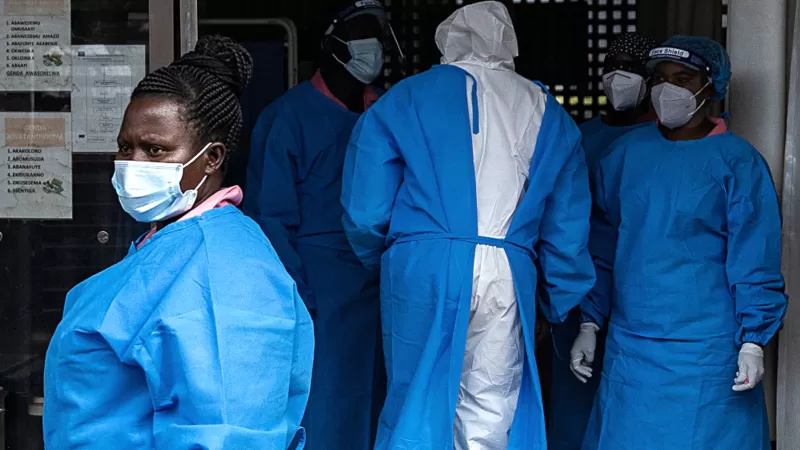An outbreak of Ebola in Uganda is proving more difficult to deal with than more recent epidemics, but the president has rejected calls for a lockdown.
So far 31 cases have been confirmed, though it is feared that there could be many more.
What is Ebola?
It is a deadly virus with initial symptoms which can include a sudden fever, intense weakness, muscle pain and a sore throat.
Subsequent stages can include vomiting, diarrhoea and – in some cases – both internal and external bleeding, known as haemorrhaging.
The incubation period can last from two days to three weeks. Ebola can be associated with other illnesses such as malaria and typhoid.
Why is this outbreak so serious?
The fact that it was three weeks before the first case was detected on 20 September has caused concern.
Ebola spreads between humans by direct contact with bodily fluids and contaminated environments. Funerals can be a particular risk if mourners have direct contact with the body.
Most of the 31 cases identified are in Uganda’s central district of Mubende, of whom six people have died.
However, the death toll may be higher. The health ministry says there were 18 deaths, linked to confirmed cases, where burials took place before they could be tested.
The World Health Organization (WHO) estimates the fatality rate is between 41% and 100%.
Is there a vaccine?
Another concern is that this is the Sudan strain of Ebola, for which there is no approved vaccine, unlike the more common Zaire strain.
This means there has been no vaccination of health workers, who account for six of the confirmed cases.
The Zaire strain was responsible for the largest ever outbreak of Ebola, in West Africa from December 2013 to 2016. More than 11,000 people died.
With more than 28,000 cases in Guinea, Liberia and Sierra Leone, scientists carried out intensive research into Ebola vaccines.
Two years after that epidemic ended, the then unlicensed Ervebo vaccine, developed by Merck, was used during an outbreak of the Zaire strain in the west of the Democratic Republic of Congo.
It was granted clearance by the WHO, which said it had limited infections and saved lives.
A second vaccine by Johnson & Johnson has since been approved for use by the European Medicines Agency.
But neither of these vaccines has been tested against the Sudan strain.
Nonetheless Uganda’s President Yoweri Museveni said his government was exploring whether it was worth trying them.
How is Uganda dealing with the outbreak?
The focus is on contact tracing – finding those who have been in close proximity with patients, especially those who attended the community funerals.
A 51-bed treatment facility is operational in Mubende district, the epicentre of the outbreak. A second facility is due to be set up soon.
President Museveni said two mobile laboratories would be sent to Mubende by Friday, so that people would not have to travel for tests and risk spreading the virus.
Medics have expressed concern about the lack of adequate personal protective equipment (PPE) such as gloves and masks. They have also called for the affected region to be put under quarantine.
However, President Museveni ruled out restrictions, saying: “Ebola is not spread like corona[virus]” as it is not an airborne disease.
He said markets, schools and places of worship would remain open, but urged people to observe personal hygiene and avoid close contact.
How does Ebola spread?
Ebola jumps to humans from infected animals, such as chimpanzees, fruit bats and forest antelope.
Bushmeat – wild forest animals hunted for human consumption – is thought to be the natural reservoir of the virus.
It then spreads between humans by direct contact with contaminated bodily fluids – blood, saliva, vomit, semen, vaginal discharge, urine, faeces and sweat.
Men who have recovered from Ebola have also been found to harbour the virus in their semen for a period after recovery.
What precautions can be taken?
To prevent infection, health professionals advise avoiding contact with cases, including stopping shaking hands, washing hands with soap and water and cleaning surfaces with chlorinated water.
It is also important to isolate cases and their contacts. Countries usually set up holding centres for suspected cases and treatment centres for laboratory-confirmed cases.
In eastern DR Congo, which borders Uganda, survivors of Ebola played a key role in providing care for infected patients as it has been established that they cannot be re-infected.
However, medical teams must wear full PPE when attending to cases to prevent infection.
Bodies, in a body bag, must be buried by those wearing proper PPE. More recent innovations have included having body bags with clear covers around the face to enable families to view the body safely before burial.
BBC


